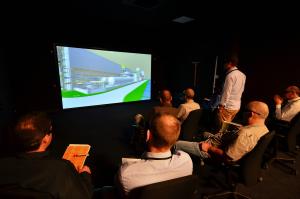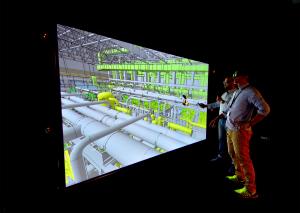Open Doors at the (virtual) cryoplant
For the members of the newly established Cryogenic Project Team it was like Open Door Day—a unique opportunity to visit the largest cryoplant ever conceived. For the better part of an hour, they walked freely among pipes and tanks, wondering at the size, complexity and even the beauty of the huge installation.
And although every element in this striking industrial landscape was familiar—after all, they had designed them all—the fascination was to see all the pieces assembled for the first time and to take in the whole of the installation from a thousand different viewpoints and perspectives.
"There's a huge difference between knowing that a certain tank is 30 metres high, and realizing what it actually feels like to be standing next to it," mused David Grillot, Cryogenic Project Team leader.
And standing next to it they were, not (yet) in the steel and concrete reality of the future ITER cryoplant, but immersed with 3D goggles in a three-dimensional rendition.
The ITER cryoplant—the cryogenic installation that will distribute ultra-cold fluids to the Tokamak's superconducting magnets, thermal shield and cryopumps—is the first ITER building to be born into virtual existence.
The rendering of the soccer-field-size installation, down to every pipe and manometre, is a spectacular achievement. "With this virtual model we have a guarantee that what we see and what we 'walk' through perfectly reflects the system as it will be."
Forms, sizes, volumes, relative positions ... all proceed from the huge CATIA database that stores and manages the 3D blueprints of the installation.
"Basically, it's the same tool that CAD designers use on daily basis," says Grillot. "What we've added here, after having simplified the data, is the 'immersive' dimension. And of course, from a viewer's perspective, it makes for an entirely different experience..."
Virtual renditions of the machine's different systems have already demonstrated their value in terms of communication. For the past year and a half, stopping at the ITER Virtual Reality Room has been a must for VIP visitors because nothing conveys the complexity, the challenges and the excitement of the project better than a 3D "immersive experience."
"The virtual cryoplant will be a great communication tool, but it will be much more than that," says cryogenic engineer Adrien Forgeas. "When an issue arises—say about integration or about a sequence of installation—we can bring all parties involved in front of the screen to acknowledge, tackle, and eventually solve the problem."
Access, maintenance and safety procedures will all benefit from the virtual cryoplant—a building made of billion bits of data that feels as real as its steel and concrete model.



